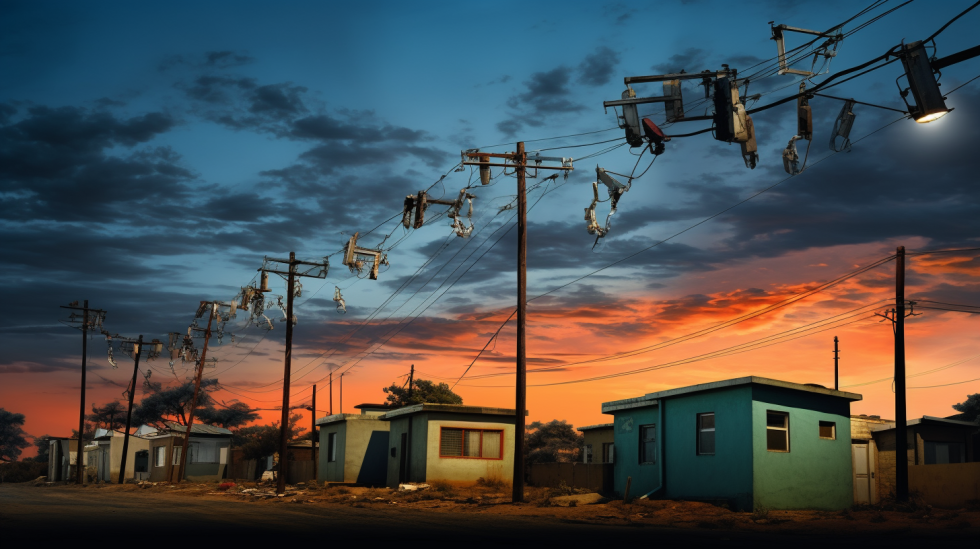Electricity is the lifeblood of modern economies, driving industries, businesses, and households. In South Africa, electricity shortages have become a recurring challenge that significantly impacts economic growth and development. The intricate relationship between power supply and economic performance is evident in the disruptions caused by load shedding and insufficient energy production. This article delves into the multifaceted ways in which electricity shortages affect the South African economy, from industrial productivity to investor confidence, while also discussing potential solutions to mitigate these challenges.
Electricity Shortages and Industrial Productivity
South Africa’s industrial sector is a key driver of economic growth and job creation. However, frequent electricity shortages have a cascading effect on industrial productivity. Factories, mines, and manufacturing units rely heavily on uninterrupted power supply to maintain production schedules and meet demand. When load shedding occurs, operations are disrupted, leading to decreased output, production delays, and increased costs.
Operational Disruptions
Frequent power cuts disrupt production lines, causing machinery to shut down unexpectedly. This results in wastage of resources, reduced output, and increased wear and tear on equipment.
Decreased Capacity Utilization
Power shortages force industries to operate at reduced capacity, leading to underutilization of resources and reduced economies of scale. This, in turn, affects overall profitability and competitiveness.
Supply Chain Disruptions
Industries are interconnected through supply chains. If one link in the chain is affected by electricity shortages, it can lead to ripple effects, affecting downstream suppliers and customers.
Investor Confidence and Economic Growth
A stable and reliable energy supply is a critical factor for attracting foreign direct investment (FDI) and stimulating economic growth. Electricity shortages erode investor confidence and create uncertainties, hampering the nation’s efforts to attract capital for development.
Uncertainty
Investors require certainty to make informed decisions. Frequent load shedding and electricity shortages create an environment of uncertainty, making long-term investments less attractive.
High Operating Costs
Industries forced to rely on expensive backup power sources experience increased operational costs. This not only reduces profitability but also deters potential investors.
Lost Opportunities
Energy-intensive sectors like mining and manufacturing often have to limit expansion plans due to electricity constraints. This results in missed opportunities for job creation and economic diversification.
Job Creation and Socioeconomic Development
A thriving economy relies on sustained job creation and inclusive growth. Electricity shortages have a direct impact on job creation and socioeconomic development.
Labor Market
Reduced industrial productivity due to electricity shortages leads to layoffs and reduced hiring. This affects the labor market, exacerbating unemployment and limiting income opportunities.
Small and Medium Enterprises (SMEs)
SMEs are particularly vulnerable to electricity shortages, as they lack the resources to invest in backup power solutions. These businesses often operate on tight margins, making them more susceptible to economic shocks.
Rural Electrification
Inadequate power supply hampers efforts to expand electricity access to rural areas, limiting opportunities for economic activities and skills development in these regions.
Mitigation Strategies and the Way Forward
Addressing electricity shortages requires a multifaceted approach that balances short-term relief with long-term sustainable solutions.
Investment in Infrastructure
South Africa needs substantial investments in energy infrastructure, including power generation, transmission, and distribution. Developing a diverse energy mix, including renewables and cleaner technologies, can enhance the country’s energy security.
Demand Management
Implementing demand-side management strategies can help reduce peak demand, lessening the strain on the grid. These measures can include energy efficiency campaigns, incentivizing off-peak consumption, and promoting renewable energy adoption.
Regulatory Reforms
Streamlining regulatory processes and creating a conducive environment for private sector participation in energy generation can enhance competition and stimulate investments in the sector.
Incentives for Energy Efficiency
Providing incentives for industries to adopt energy-efficient practices can reduce overall energy demand and improve industrial productivity.
Skills Development
Investing in a skilled workforce in the energy sector is essential for maintaining and expanding energy infrastructure. Skills development programs can ensure a pool of trained professionals to address technical challenges.
Conclusion
Electricity shortages pose a significant threat to South Africa’s economic growth, industrial productivity, and job creation efforts. The interplay between power supply and economic performance underscores the need for a holistic approach to address this challenge. As the country works toward energy security and sustainability, investing in infrastructure, promoting energy efficiency, and creating an environment conducive to private sector participation are critical steps. Balancing short-term relief with long-term solutions will be key in powering up South Africa’s economy and ensuring a brighter future for its citizens.

